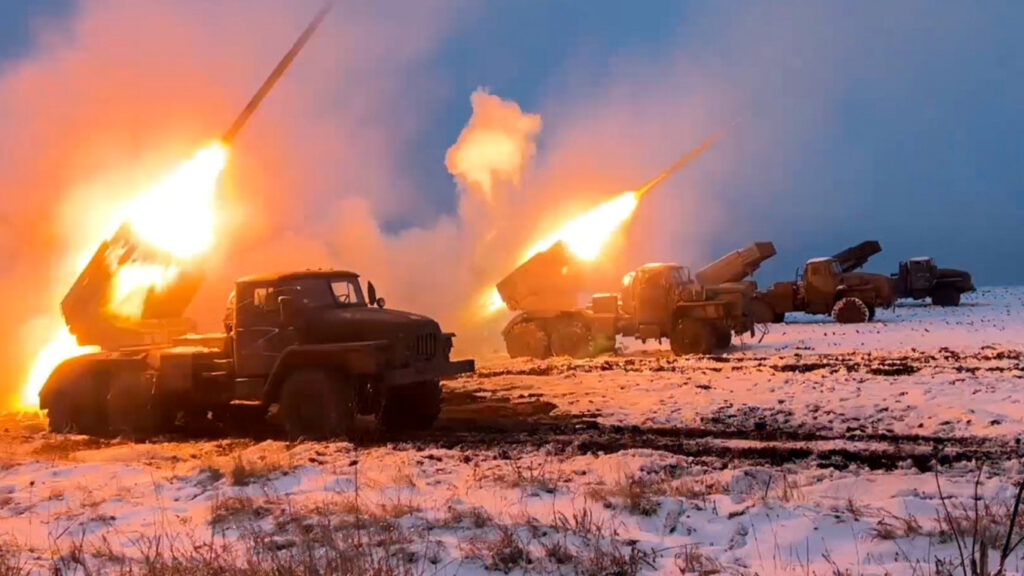
The foto has taken from the Moscow Times
STRATEGIC ASSESSMENT-Jakarta. University of Indonesia international law professor Hikmahanto Juwana, in a virtual discussion on Medcom.id expressed hope that the government would remain neutral in dealing with the conflict between Russia and Ukraine and be proactive in encouraging the two countries to immediately reduce the conflict.

Hikmahanto proposed that President Jokowi meet with Russian President Vladimir Putin and Ukrainian President Volodymyr Zelenskyy again to resolve the war because he saw the impending crisis. House Commission I member M. Farhan supports Indonesia in using its position as ASEAN chair to invite Ukraine to soften its stance. Farhan also suggested that the government engage in diplomacy with relevant parties, such as the United States and China, in order to halt any escalation this year.
U.S. President Joe Biden made an unannounced five-hour visit to Kyiv, Ukraine. The visit was Washington’s move to reaffirm its support for Kyiv as the Ukrainian war enters its one year on Feb. 24. “One year ago, the world feared that Ukraine would be destroyed. Look, one year passed and Ukraine survived.

Democracy survives because the whole world supports it,” Biden said in a press conference with Ukrainian President Volodymyr Zelenskyy at the Mariinsky Palace after the bilateral meeting. Additionally, Biden urged allies to expedite the aid flow to Ukraine. Howitzer cannons, missiles for air defense artillery, and anti-tank missiles were all part of Biden’s $500 million aid package.
According to U.S. Secretary of State Antony Blinken in an interview aired on Sunday on NBC, the United States is concerned that China may be considering giving Russia lethal weapons.
In conversations with Chinese Communist Party Central Foreign Affairs Commission Office Director and State Councilor Wang Yi, Blinken claimed to have had the chance to express very real U.S. concerns about China’s support for Russia.

According to Blinken, giving Russia lethal support would have serious consequences for Beijing in U.S.-China relations. China has thus far voiced concern over the conflict in Ukraine. China’s position on the Ukraine conflict was characterized as objective and impartial by Chinese Foreign Affairs Minister Qin Gang.
President Joe Biden told ABC News anchor David Muir in a new interview that it was a “big mistake” for Russian President Vladimir Putin to temporarily suspend Russia’s participation in the last remaining nuclear arms treaty between the two countries.
“It’s a big mistake to do that. Not very responsible. But I don’t read into that that he’s thinking of using nuclear weapons or anything like that,” Biden told Muir in Poland on Wednesday, before the president flew back to Washington.
Biden said he was “not sure what else he [Putin] was able to say in his speech at the moment, but I think it’s a mistake and I’m confident we’ll be able to work it out.”
Chinese leader Xi Jinping is planning to visit Moscow for a meeting with Vladimir Putin in the coming months, The Wall Street Journal reported, citing people familiar with the matter.
Xi’s meeting with Putin will be a part of a push for multilateral peace negotiations as Beijing claims it wants to play a more active role in ending the war against Ukraine, the sources said. The visit will also reportedly allow China to reiterate its calls not to use nuclear weapons.
According to the people familiar with Xi’s plans, preparations for the visit are at an early stage, and its timing has not yet been determined. Xi may travel to Russia in April or early May, when Russia will celebrate the victory in World War II, the sources said to The WSJ.

U.S. Treasury Secretary Janet Yellen said the United States would resume discussions with China on economic issues “at an appropriate time” but is continuing to warn Beijing of the consequences of violating U.S. sanctions on Russia.
President Biden said Ukraine “will never be a victory for Russia” during a speech in Poland, ahead of the first anniversary of the Russo-Ukrainian war. Biden also responded to an anti-Western speech Russian President Vladimir Putin made hours earlier. Biden insisted Western countries are not planning to attack Russia as Putin has said. He also made sure that the United States and NATO would continue to support Ukraine with various kinds of assistance.
High-level meetings between China and the United States are again front-and-center for markets, and the official statements that follow those meetings are parsed by some investors as closely as Federal Reserve minutes.
Investors want to know where the relationship is headed, so it’s significant how much Washington’s diplomatic take can differ from Beijing’s — in content and in tone.
U.S. Secretary of State Antony Blinken and China’s top diplomat Wang Yi met last weekend in Germany to discuss Ukraine, Taiwan and this month’s intrusion into U.S. airspace by — and the U.S. shoot-down of — a Chinese “spy balloon.”
An air-to-air missile-equipped Chinese fighter jet stopped a U.S. military plane over the South China Sea. The U.S. military plane was being manned by a P-8 Poseidon personnel from the U.S. Navy. The aircraft was traveling over the waters, approximately 30 miles away from the Paracel Islands, where Chinese troops are currently stationed on the biggest island in the area. There are 130 tiny islets in the islands, which are currently in dispute between three countries.
The chairman of the European Parliament Committee on Foreign Affairs (AFET), David McAllister, expressed hope that Indonesia would take part in the upcoming vote in New York, having noted that it backed three previous U.N. resolutions condemning Russia’s invasion of Ukraine on Feb. 24, 2022.
“I hope that Indonesia will join the EU countries and many others in support of the U.N. resolution that will be voted on in New York tomorrow,” McAllister told a press conference in the Indonesian capital.
Indonesia’s message has remained the same, appealing to both Russia and Ukraine to immediately stop the war, with neither party indicating any qualms about Indonesia’s stance.
The U.N. General Assembly has approved a resolution demanding that Russia immediately pull all of its troops out of Ukraine and calling for a cessation of hostilities, one year after Moscow invaded its western neighbor. The non-binding resolution was approved by 141 countries. Seven voted no and 32 abstained, including China and India. The U.N. resolution calls for a “just, sustainable, and lasting peace” in Ukraine and demands that those who have committed war crimes in the conflict be held accountable.
Ukrainian Ambassador to Indonesia Vasyl Hamianin in a discussion on “Covering War in Ukraine: the View from Indonesian Journalists,” hosted by the United States Embassy’s cultural center @america on Thursday commended the Indonesian media for its efforts to seek information and clarifications to dispel the propaganda that has been prevalent in the war between Russia and Ukraine.
He said one of the biggest challenges during the Russian attack was propaganda, given Ukraine’s history of fighting imperialism and slavery for many years. “The propaganda that has been contaminating the minds and hearts for not only for Indonesian people, but also worldwide,” Ambassador Hamianin said.
Qin Gang’s trip to Indonesia – his first visit to Southeast Asia since his appointment as China’s foreign minister last year – has shown that Beijing is increasingly concerned that the region is leaning more towards the United States, analysts said.
While the agenda for Qin’s two-day trip this week was dominated by trade and infrastructure development, statements from the Chinese side, as well as remarks by officials from both countries, revealed growing unease about a rivalry between China and the US, according to diplomatic observers.
The anxiety, they said, reflected the challenges both the US and China face as they try to nudge Asean countries to pick sides on particular issues.
Center for ASEAN Studies at the Chinese Academy of Social Sciences (CASS) Director Xu Liping said Chinese Foreign Affairs Minister Qin Gang’s visit to Indonesia has strategic significance that can boost bilateral relations and cooperation in all fields. He emphasized that the two countries had made numerous efforts to realize major projects, such as the Regional Comprehensive Economic Corridor, “Two Countries, Twin Parks,” and the Jakarta-Bandung high-speed rail. Qin said China regards Indonesia as an important strategic partner in Asia.
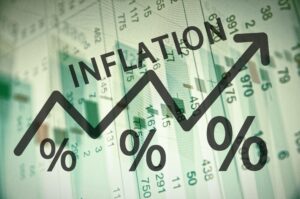
The Federal Reserve’s preferred inflation gauge ticked higher in January, a sign that price pressures remain entrenched in the US economy and could lead the Fed to keep raising interest rates well into this year. Friday’s report from the commerce department showed that consumer prices rose 0.6% from December to January, up sharply from a 0.2% increase from November 2022. The report also showed that consumer spending rose 1.8% last month from December after falling the previous month.
A majority of the nation’s business economists expect a U.S. recession to begin later this year than they had previously forecast, after a series of reports have pointed to a surprisingly resilient economy despite steadily higher interest rates.
Fifty-eight percent of 48 economists who responded to a survey by the National Association for Business Economics envision a recession sometime this year, the same proportion who said so in the NABE’s survey in December. But only a quarter think a recession will have begun by the end of March, only half the proportion who had thought so in December. The findings, reflecting a survey of economists from businesses, trade associations and academia.
A majority of the nation’s business economists expect a U.S. recession to begin later this year than they had previously forecast, after a series of reports have pointed to a surprisingly resilient economy despite steadily higher interest rates. Fifty-eight percent of 48 economists who responded to a survey by the National Association for Business Economics envision a recession sometime this year.
Fifty-eight percent of survey panelists continue to believe a recession is likely to occur in 2023. Only 33% of the economists who responded to the survey now expect a recession to begin in the April-June quarter. One-fifth, or 21%, think it will start in the July-September quarter.
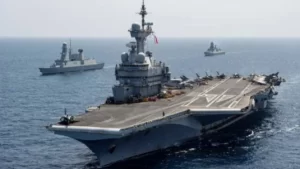
U.S. Navy Chief Carlos Del Toro at the National Press Club in Washington, D.C. said the United States is currently unable to match China’s naval power. China’s navy has significant advantages over its U.S. counterpart, including a larger fleet and greater shipbuilding capacity, as Beijing seeks to project its power across the seas.
He predicted that, up from the current level of about 340 vessels, China’s naval might could reach 400 vessels in the upcoming years. In contrast, there are fewer than 300 vessels in the U.S. fleet.
Russia’s parliament rushed to approve a move announced the previous day by President Vladimir Putin, all but finalizing the end of Russia’s participation in the New START arms control treaty — the last pact between the world’s biggest nuclear powers regulating their atomic arsenals.
Russia’s “suspension” of its participation in the treaty came as it emerged that Moscow had tried but apparently failed to conduct a new test launch of its most powerful intercontinental ballistic missile.
A U.S. official told CBS News that Russia carried out a test of an intercontinental ballistic missile on February 18, which failed. That launch came just two days before Mr. Biden arrived for an unannounced visit in Kyiv, Ukraine.
Indonesia voted in favor of a U.N. General Assembly (UNGA) resolution demanding that Russia “immediately” withdraw its troops from Ukraine, marking the one-year anniversary of a war felt around the world.
However, Jakarta’s representatives in New York also voiced concern that the motion adopted with strong backing from member states had missed the mark on the “spirit of realizing peace,” lacking any calls for both conflicting parties to pursue peaceful dialogue.
Explaining Indonesia’s vote, Indonesian Permanent Representative to the United Nations Arrmanatha Nasir said the world was “no closer to peace” since the beginning of the war and that the impacts of the war had gone beyond the borders of both Ukraine and Russia.
On the one-year anniversary of the Russo-Ukrainian War, Indonesia will maintain its position on the military conflict by prioritizing peace efforts to resolve the conflict.
Indonesian Foreign Affairs Ministry spokesperson Teuku Faizasyah said that the country would not go the mediation route like Turkey, but would instead continue to push for the restart of a peace process between the two countries.
Indonesia, according to Faizasyah, will support peace efforts through government statements in various forums, such as the U.N. forum and bilateral interactions with other countries. Faizasyah also hopes that the conflict will be resolved peacefully soon.
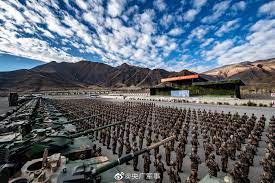
The United States warned China of serious consequences if it provided arms to support Russia’s invasion of Ukraine, as Kyiv’s top general visited the frontline town of Bakhmut where Ukrainian defenders were holding out against constant attacks.
Washington and its NATO allies are scrambling to dissuade China from providing military aid for Moscow’s war, making public comments on their belief that Beijing is considering providing lethal equipment possibly including drones.
Western fears of China helping to arm Russia come as Moscow’s forces struggle to make gains around key objectives in eastern Ukraine, and as Kyiv prepares a counteroffensive with advanced Western weapons including battle tanks.
US President Joe Biden is using $1.5 trillion in new federal spending to continue his push to reshape the U.S. economy, redirect corporate profits and reverse a decades-old decline in the benefits that go to workers.
With a new team of progressive-leaning economic advisers and a fiscal war chest of three massive spending bills, the Biden administration is using new guidelines to pressure companies to expand childcare, produce more in the United States and hire more equitably.
The Commerce Department on Tuesday rolled out the terms for companies to apply for $52 billion in semiconductor manufacturing subsidies that require them to plan for access to child care for their workers, use low-emission energy sources, limit stock buybacks, and allow their workers to unionize.
China’s factory sector grew in February at the fastest pace in more than a decade in a boost for global economy recovery hopes, while data across the U.S. and Europe underlined that inflation in both regions was still not under control.
Adding to evidence that activity is rebounding in China after the removal of strict COVID-19 curbs, its manufacturing purchasing managers’ index (PMI) released previously climbed to 52.6 last month from 50.1 in January, while a private sector survey also showed growth for the first time in seven months.
“China’s PMIs beat market expectations across the board, propelled by the reopening after dropping COVID restrictions and the resumption of activity after the lunar new year holiday,” Duncan Wrigley at Pantheon Macroeconomics said.
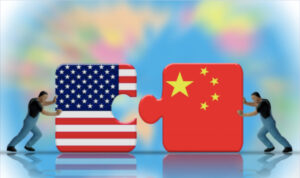
A newly formed House committee devoted to examining economic competition between the U.S. and China is holding its first hearing, capping off a day of maneuvers on Capitol Hill aimed at holding Beijing accountable for recent national security offenses.
The Select Committee on the Strategic Competition Between the United States and the Chinese Communist Party was formed in January shortly after Republicans took the majority in the House. Committee Chair Rep. Mike Gallagher said the hearing will spotlight human rights.
“We may call this a ‘strategic competition,’ but this is not a polite tennis match,” Gallagher, R-Wis., will say in his opening remarks, according to a copy reviewed ahead of the hearing. “This is an existential struggle over what life will look like in the 21st century — and the most fundamental freedoms are at stake.”
U.S. Secretary of State Antony Blinken and Russian Foreign Minister Sergey Lavrov talked briefly at a meeting of top diplomats from the Group of 20 nations in the first high-level meeting in months between the two countries.
U.S. officials said Blinken and Lavrov chatted for roughly 10 minutes on the sidelines of the G-20 conference in New Delhi. The short encounter came as relations between Washington and Moscow have plummeted while tensions over Russia’s war with Ukraine have soared.

A senior U.S. official said Blinken used the discussion to make three points to Lavrov: that the U.S. would support Ukraine in the conflict for as long as it takes to bring the war to an end, that Russia should reverse its decision to suspend participation in the New START nuclear treaty and that Moscow should release detained American Paul Whelan.
Commerce Secretary Gina Raimondo is considering a trip to China this year, a visit by one of the top US officials driving Washington’s efforts to limit Beijing’s technology ambitions amid multiple tensions between the two world’s biggest economies.
President Joe Biden is “looking to engage with China in all ways that are good for America, commercially, diplomatically – that communication is intended to de-escalate. That’s where we want to be in our relationship with China – not escalating”, Raimondo said in an interview at Bloomberg’s office in Washington.
“I’m certainly going to be sending my team over – probably even this spring. We’re trying to work that out. And yes, I think probably I would” go, she said.
Demand for U.S. workers shows signs of slowing, a long-anticipated development that is appearing in private-sector job postings even while government reports indicate the labor market is running hot.
Robust government data on job openings and hiring are among the reasons Federal Reserve officials believe the U.S. economy is overheated, fueling high inflation. Fed officials are raising interest rates in an attempt to slow growth and reduce price pressures. If government reports move in line with the recruitment business, Fed officials could feel less pressure to move aggressively.
However, private data point to a decline in available jobs. The National Federation of Independent Business, which represents small businesses, and LinkUp, a research firm that tracks job listings that companies place on their own websites, show a sharper drop in postings than recent government reports on openings.
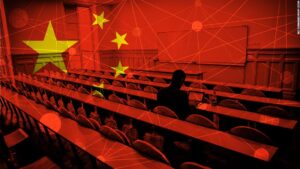
A new House panel on U.S.-China relations held its first hearing in prime time, exploring threats posed by the Chinese government and possible bipartisan solutions.
Four witnesses — including H.R. McMaster, former president Donald Trump’s national security adviser, and Tong Yi, a former secretary to prominent Chinese dissident Wei Jingsheng — spoke about issues involving national security, economic competition and human rights.
Over the course of three hours, they made a case for how the Chinese Communist Party has gained power over global markets and endangered American interests.
Attorney General Merrick Garland made an unannounced trip to Ukraine, according to a Justice Department official, his second trip to the country after Russia invaded a little more than a year ago. The trip was not announced for security reasons, the official said.
Garland was invited to Lviv by the Ukrainian prosecutor general, the official said, and joined President Volodymyr Zelensky at the “United for Justice Conference.”
The official added that Garland “held several meetings and reaffirmed our determination to hold Russia accountable for crimes committed in its unjust and unprovoked invasion against its sovereign neighbor.”
An avalanche of hot inflation data over the past month has lifted US borrowing costs to the highest point in a decade and a half, intensifying debate over how much further interest rates must rise to rein in soaring consumer prices.
The yield on the two-year Treasury note hit 4.94 per cent, a level last reached in 2007 before the global financial crisis. Yields on 10-year and 30-year Treasuries this week broke through 4 per cent for the first time since November.
The moves follow weeks of unrelenting data showing inflation in the US running hotter than economists had expected, putting pressure on the Federal Reserve to redouble efforts to tamp down growth by raising interest rates.

Renewed military cooperation between the Philippines and the United States raises concerns about escalating the South China Sea conflict. Since taking office in June 2022, Philippine President Ferdinand Marcos Jr. has pledged to defend his territorial sovereignty from foreign threats.
Although not explicitly, the foreign power Marcos Jr. meant was China because the country’s maritime patrols clashed with Philippine troops guarding the Spratly and Paracel Islands in the South China Sea.
Not only the Philippines, in the Spratlys and Paracels, China pressures Vietnam, Malaysia, Brunei, and Taiwan. China’s dispute with four ASEAN nations plus Taiwan came from overlapping claims in the two island chains.
Negotiations have not yielded a peaceful solution, and conflict is likely to increase. If China and five other countries cannot resolve South China Sea disputes, it is very likely the United States will intervene.
Trade, military, economic, and global influence competition is also straining U.S.-China relations. It is worrisome if the two major powers fight in the South China Sea. If these fears come true, regional security and peace will be in dire straits.

February 24 marked one year since Russia’s invasion of Ukraine. The war’s impacts on food and energy security have been felt worldwide, and Southeast Asia is no exception. Public opinion in the region appears more sympathetic to Ukraine than Russia, but that is far from universal.
And the region’s governments have not been united in their responses. On the anniversary of the invasion, the United Nations General Assembly voted to condemn the invasion and called for an immediate withdrawal of Russian troops. More than 140 countries supported the resolution, including all of Southeast Asia except Laos and Vietnam, which abstained.
There have been four UN resolutions on the war since March 2022, and Southeast Asian countries have had a mixed voting record. Only the Philippines and Myanmar, whose seat is held by a representative of the ousted National League for Democracy-led government, have supported all four resolutions.
Brunei, Cambodia, Indonesia, Malaysia, and Singapore voted yes on three but abstained from an April 2022 resolution to suspend Russia from the UN Human Rights Council. Laos and Vietnam did the opposite, abstaining from three and voting no on the April resolution.
Thailand supported two but abstained from the April vote and another in October condemning Russia’s annexation of Ukrainian territories. That was ostensibly a failed attempt to ensure President Vladimir Putin’s attendance at last year’s APEC Leaders’ Summit in Bangkok.
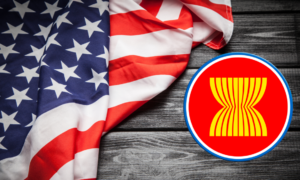
The Association of Southeast Asian Nations (ASEAN) issued three statements on the conflict in February, March, and April 2022 which called on “all parties” to exercise restraint and resolve the conflict peacefully. None mentioned Russia or Ukraine by name.
According to Stephen S. Roach, a former chairman of Morgan Stanley Asia, a faculty member at Yale University, and the author of Accidental Conflict: America, China, and the Clash of False Narratives (Yale University Press, 2022), the world is simmering with conflict and resentment. All that is missing is a triggering event. With tensions in Taiwan, the South China Sea, and Ukraine, there are plenty of possible sparks to worry about. Taiwan is a leading candidate. Even if, like me, you do not accept the U.S. view that President Xi Jinping has consciously shortened the timeline for reunification, recent actions by the U.S. government may end up forcing his hand.
I worry just as much about a spark in Ukraine. One year into this horrific and once-unthinkable conflict, there is a new and ominous twist to Russian President Vladimir Putin’s spring offensive. There are plenty of other potential sparks, not least from ongoing tensions in the South China Sea. Context is key in assessing the likelihood of any spark.
Under the political cover of what it bills as a battle between autocracy and democracy, the United States has clearly been the aggressor in turning up the heat on Taiwan over the past six months. Similarly, the Chinese surveillance balloon incident brought the cold-war threat much closer to home for the U.S. public.
Having just published a book about accidental conflict as an outgrowth of dueling false narratives between the United States and China, I am particularly worried about “narrative segmentation.” Each side is convinced that it holds the moral high ground as conflict lurches from one incident to another.
Three great powers — United States, China, and Russia — all seem to be afflicted by a profound sense of historical amnesia. They are collectively sleepwalking down a path of conflict escalation, carrying high-octane fuel that could be ignited all too easily. Just like 1914.





